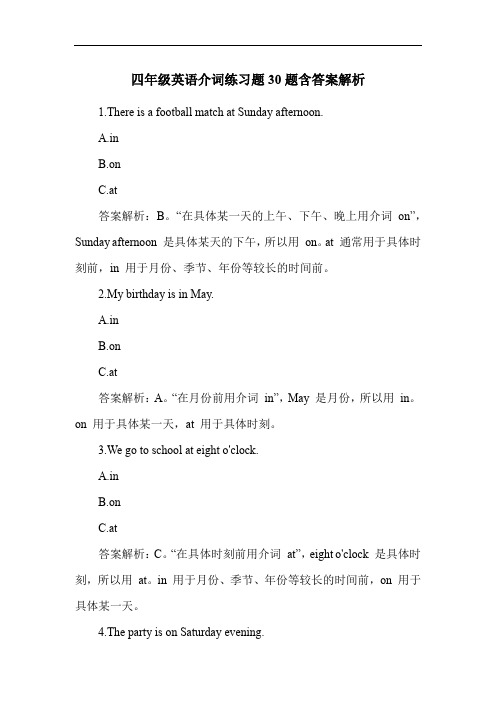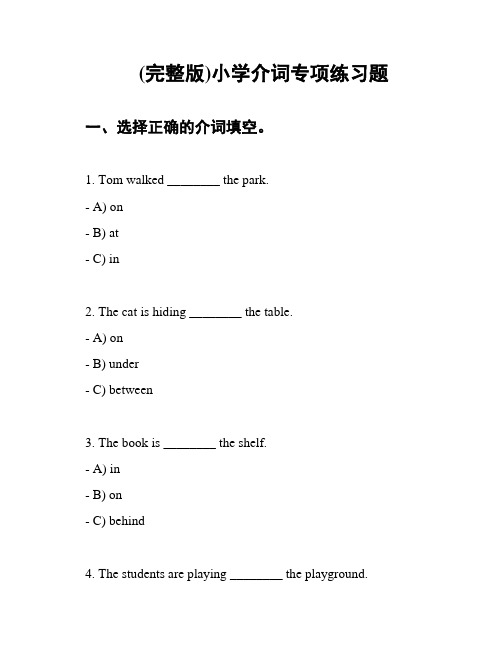小学介词专项练习
四年级英语介词练习题30题含答案解析

四年级英语介词练习题30题含答案解析1.There is a football match at Sunday afternoon.A.inB.onC.at答案解析:B。
“在具体某一天的上午、下午、晚上用介词on”,Sunday afternoon 是具体某天的下午,所以用on。
at 通常用于具体时刻前,in 用于月份、季节、年份等较长的时间前。
2.My birthday is in May.A.inB.onC.at答案解析:A。
“在月份前用介词in”,May 是月份,所以用in。
on 用于具体某一天,at 用于具体时刻。
3.We go to school at eight o'clock.A.inB.onC.at答案解析:C。
“在具体时刻前用介词at”,eight o'clock 是具体时刻,所以用at。
in 用于月份、季节、年份等较长的时间前,on 用于具体某一天。
4.The party is on Saturday evening.B.onC.at答案解析:B。
“在具体某一天的晚上用介词on”,Saturday evening 是具体某天的晚上,所以用on。
at 用于具体时刻,in 用于月份、季节、年份等较长的时间前。
5.She gets up at six in the morning.A.inB.onC.at答案解析:C。
“在具体时刻前用介词at”,six 是具体时刻,所以用at。
in the morning 是固定搭配,表示“在早上”。
on 用于具体某一天。
6.The concert is in July.A.inB.onC.at答案解析:A。
“在月份前用介词in”,July 是月份,所以用in。
on 用于具体某一天,at 用于具体时刻。
7.We have a picnic on Sunday.A.inB.on答案解析:B。
“在具体某一天用介词on”,Sunday 是具体某一天,所以用on。
五年级介词训练练习题30题含答案解析

五年级介词训练练习题30题含答案解析1.There is an English class ____ Monday morning.A.inB.onC.at答案解析:B。
“on”用于具体的某一天的上午、下午或晚上。
“in”用于较长的时间段,如年、月、季节等。
“at”用于具体的时刻。
本题中是具体的周一上午,所以用“on”。
2.My birthday is ____ April.A.inB.onC.at答案解析:A。
“in”用于较长的时间段,四月是一个月,所以用“in”。
“on”用于具体的某一天,“at”用于具体的时刻。
3.We usually go to school ____ seven o'clock.A.inB.onC.at答案解析:C。
“at”用于具体的时刻,七点是具体的时刻,所以用“at”。
“in”用于较长的时间段,“on”用于具体的某一天的上午、下午或晚上。
4.The sports meeting is ____ May 15th.B.onC.at答案解析:B。
“on”用于具体的某一天,五月十五日是具体的一天,所以用“on”。
“in”用于较长的时间段,“at”用于具体的时刻。
5.I often do my homework ____ the evening.A.inB.onC.at答案解析:A。
“in”用于较长的时间段,晚上是一个较长的时间段,所以用“in”。
“on”用于具体的某一天的上午、下午或晚上,“at”用于具体的时刻。
6.The party will start ____ 8 pm.A.inB.onC.at答案解析:C。
“at”用于具体的时刻,八点是具体的时刻,所以用“at”。
“in”用于较长的时间段,“on”用于具体的某一天的上午、下午或晚上。
7.My mother gets up early ____ the morning.A.inB.on答案解析:A。
“in”用于较长的时间段,早上是一个较长的时间段,所以用“in”。
介词试题及答案小学

介词试题及答案小学一、选择题(每题2分,共20分)1. 我经常在周末去公园玩。
A. 在B. 到C. 从D. 跟答案:A2. 她每天早晨从家走到学校。
A. 从B. 到C. 跟D. 去答案:A3. 他正在看一本书。
A. 看B. 读C. 听D. 写答案:B4. 我们一起去公园。
A. 去B. 到C. 跟D. 从答案:A5. 我昨天晚上看了一部动画片。
A. 看B. 读C. 听D. 写答案:A6. 他正在吃午饭。
A. 吃B. 喝C. 玩D. 睡答案:A7. 请把书放在桌子上。
A. 放B. 拿C. 看D. 读答案:A8. 她喜欢唱歌和跳舞。
A. 和B. 跟C. 到D. 从答案:A9. 他们正在操场上踢足球。
A. 在B. 到C. 跟D. 从答案:A10. 我每天早晨都喝牛奶。
A. 喝B. 吃C. 玩D. 睡答案:A二、填空题(每题2分,共20分)1. 我_____家去学校。
答案:从2. 他_____教室走出来。
答案:从3. 我们_____公园里散步。
答案:在4. 她_____家里做作业。
答案:在5. 他们_____公园里放风筝。
答案:在6. 我_____图书馆借了一本书。
答案:从7. 他_____超市买了一些水果。
答案:在8. 我们_____学校门口见面。
答案:在9. 她_____家里看电视。
答案:在10. 我_____商店买了一支笔。
答案:在三、连词成句(每题5分,共30分)1. 我家从学校去答案:我从家去学校。
2. 他书读正在一本书答案:他正在读一本书。
3. 我们公园去一起答案:我们一起去公园。
4. 她跳舞喜欢唱歌和答案:她喜欢唱歌和跳舞。
5. 他们操场上踢足球正在答案:他们正在操场上踢足球。
6. 我牛奶喝每天早晨都答案:我每天早晨都喝牛奶。
7. 他午饭吃正在答案:他正在吃午饭。
8. 请桌子上书把放答案:请把书放在桌子上。
9. 她家里做作业在答案:她在家里做作业。
10. 我一支笔买了商店答案:我在商店买了一支笔。
(完整版)小学介词专项练习题

(完整版)小学介词专项练习题一、选择正确的介词填空。
1. Tom walked ________ the park.- A) on- B) at- C) in2. The cat is hiding ________ the table.- A) on- B) under- C) between3. The book is ________ the shelf.- A) in- B) on- C) behind4. The students are playing ________ the playground.- A) at- B) in- C) on5. We will meet ________ the cinema.- A) in- B) at- C) on6. The dog is jumping ________ the river. - A) on- B) into- C) over7. The key is ________ the door.- A) on- B) under- C) in8. Lucy is sitting ________ her desk.- A) at- B) on- C) in9. Mark is standing ________ his sister.- A) at- B) between- C) on10. The ball is rolling ________ the hill.- A) up- B) down- C) across11. We are having dinner ________ a restaurant. - A) at- B) in- C) on12. The cat jumped ________ the box.- A) into- B) on- C) over13. The birds are flying ________ the sky.- A) over- B) on- C) under14. The girl is standing ________ the tree.- A) behind- B) on- C) in front of15. They went swimming ________ the pool.- A) at- B) in- C) on二、根据汉语提示,选择正确的英语介词填空。
四年级介词练习30题含答案解析

四年级介词练习30题含答案解析1.There is an English class ____ Monday.A.inB.onC.at答案解析:B。
“on”用于具体的某一天,Monday 是具体的一天,所以用on。
“in”用于较长的时间段,如in May(在五月);“at”用于具体的时间点,如at six o'clock(在六点钟)。
2.I get up ____ six o'clock in the morning.A.inB.onC.at答案解析:C。
“at”用于具体的时间点,six o'clock 是具体的时间点,所以用at。
“in”用于较长的时间段;“on”用于具体的某一天。
3.We have a picnic ____ Sunday afternoon.A.inB.onC.at答案解析:B。
“on”用于具体的某一天的上午、下午或晚上,Sunday afternoon 是具体的一天的下午,所以用on。
“in”用于较长的时间段;“at”用于具体的时间点。
4.My birthday is ____ May.B.onC.at答案解析:A。
“in”用于较长的时间段,May 是一个月,属于较长的时间段,所以用in。
“on”用于具体的某一天;“at”用于具体的时间点。
5.The party starts ____ seven o'clock in the evening.A.inB.onC.at答案解析:C。
“at”用于具体的时间点,seven o'clock 是具体的时间点,所以用at。
“in”用于较长的时间段;“on”用于具体的某一天。
6.We go to school ____ the morning.A.inB.onC.at答案解析:A。
“in”用于上午、下午、晚上等较长的时间段,in the morning((在上午)是固定用法。
“on”用于具体的某一天;“at”用于具体的时间点。
五年级介词训练练习题30题(带答案)

五年级介词训练练习题30题(带答案)1.There is a football match on Sunday _____.A.inB.atC.onD./答案解析:C。
“on Sunday”表示在具体的某一天用介词on。
in 通常用于月份、季节、年份等;at 用于具体的时刻;/不能单独表示在周日。
2.We often go swimming _____ summer.A.inB.atC.onD./答案解析:A。
“in summer”表示在夏天,in 用于季节。
at 用于具体的时刻;on 用于具体的某一天;/不能单独表示在夏天。
3.I get up _____ six o'clock in the morning.A.inB.atC.onD./答案解析:B。
“at six o'clock”表示在具体的时刻用介词at。
in 用于月份、季节、年份等;on 用于具体的某一天;/不能单独表示在六点钟。
4.My birthday is _____ March.A.inB.atC.onD./答案解析:A。
“in March”表示在三月,in 用于月份。
at 用于具体的时刻;on 用于具体的某一天;/不能单独表示在三月。
5.We have a picnic _____ the weekend.A.inB.atC.onD./答案解析:C。
“on the weekend”表示在周末,固定用法用介词on。
in 通常用于月份、季节、年份等;at 用于具体的时刻;/不能单独表示在周末。
6.The school trip is _____ May 1st.A.inB.atC.onD./答案解析:C。
“on May 1st”表示在具体的某一天用介词on。
in 用于月份、季节、年份等;at 用于具体的时刻;/不能单独表示在五月一日。
7.I do my homework _____ the evening.A.inB.atC.onD./答案解析:A。
四年级英语介词用法练习题20题含答案解析

四年级英语介词用法练习题20题含答案解析1. I go to school ____ 8 o'clock every morning.A. inB. onC. at答案解析:C。
“at”用于具体的时刻前,“8 o'clock”是具体的时刻,所以用“at”。
“in”通常用于表示较长的时间段,如“in the morning”(泛指在上午),但不用于具体的时刻。
“on”用于具体的日期或者特定的某天,这里不是日期或特定某天,所以不能用“on”。
2. My birthday is ____ May.A. atB. onC. in答案解析:C。
“in”用于表示在某个月份,“May”是五月,是月份,所以用“in”。
“at”用于具体时刻,“on”用于具体日期,这里是月份,不能用“at”和“on”。
3. We have a party ____ Saturday.A. atB. inC. on答案解析:C。
“on”用于表示在星期几,“Saturday”是星期六,所以用“on”。
“at”用于具体时刻,“in”用于较长时间段,如月份、年份等,这里是星期,不能用“at”和“in”。
4. She gets up early ____ the morning.A. atB. inC. on答案解析:B。
“in the morning”是固定搭配,表示在上午。
“at”用于具体时刻,这里不是具体时刻,不能用“at”。
“on”用于具体日期或特定某天,这里不是日期或特定某天,不能用“on”。
5. The movie starts ____ 7:30 p.m.A. inB. onC. at答案解析:C。
“at”用于具体的时刻,“7:30 p.m.”是具体的时刻,所以用“at”。
“in”用于较长时间段,“on”用于具体日期或特定某天,这里是具体时刻,不能用“in”和“on”。
6. My sister was born ____ 2010.A. atB. inC. on答案解析:B。
六年级英语介词练习题40题(带答案)

六年级英语介词练习题40题(带答案)1. My birthday is ____ June.A. atB. inC. on答案解析:B。
“in”用于表示在某个较长的时间段内,如月份、年份、季节等,June(六月)是月份,所以用“in”。
“at”通常用于表示具体的时刻,如“at 6 o'clock” 在六点),这里不能用“at”。
“on”用于表示具体的某一天,如“on June 1st”( 在六月一日),这里只是说在六月,不是具体某一天,所以不能用“on”。
2. We have English class ____ Monday morning.A. atB. inC. on答案解析:C。
“on”用于表示具体的某一天或者某一天的上午、下午、晚上,这里是Monday morning 星期一上午),是具体某一天的上午,所以用“on”。
“at”用于具体时刻,不符合此处。
“in”用于较长时间段,如月份、年份等,不用于具体某天的上午,所以不选“in”。
3. The party will start ____ 7:00 p.m.A. atB. inC. on答案解析:A。
“at”用于表示具体的时刻,7:00 p.m. 下午七点)是具体的时刻,所以用“at”。
“in”用于较长时间段,“on”用于具体某天或某天的上午、下午、晚上,均不符合此处。
4. My sister was born ____ winter.A. atB. inC. on答案解析:B。
“in”用于表示在某个季节里,winter(冬天)是季节,所以用“in”。
“at”用于具体时刻,“on”用于具体某天等,都不适合用于季节。
5. Our school sports meeting is ____ May 10th.A. atB. inC. on答案解析:C。
“on”用于表示具体的某一天,May 10th 五月十日)是具体的一天,所以用“on”。
- 1、下载文档前请自行甄别文档内容的完整性,平台不提供额外的编辑、内容补充、找答案等附加服务。
- 2、"仅部分预览"的文档,不可在线预览部分如存在完整性等问题,可反馈申请退款(可完整预览的文档不适用该条件!)。
- 3、如文档侵犯您的权益,请联系客服反馈,我们会尽快为您处理(人工客服工作时间:9:00-18:30)。
小学介词专项练习一、时间:1)in , on,at 在……时in表示较长时间,如世纪、朝代、时代、年、季节、月及一般(非特指)的早、中、晚等。
如in the 20th century, in the 1950s, in 1989, in summer, in January, in the morning, in one’s life , in one’s thirties等。
on表示具体某一天及其早、中、晚。
如on May 1st, on Monday, on New Year’s Day, on a cold night in January, on a fine morning, on Sunday afternoon等。
注意:在last, next, this, that, some, every 等词之前一律不用介词。
如:We meet every day.at表示表示某一时刻或较短暂的时间,或泛指圣诞节,复活节等在:at seven o’clock, at a quarter past four, at eleven twenty, at noon, at night, at midnight, at this time of year, at the beginning of…, at the end of …, at the age of …, at Christmas, at this moment等。
1) My father usually goes to work ________ (at, in, on) 8:00.2) The party will begin ______ (at, in, on) 2:00pm.表示在早晨,下午,晚上:in the morning, in the afternoon, in the evening.1) We never go shopping ______ (at, in, on) the evening.2) I get up at 7:30 _______ (at, in, on) the morning.表示在具体某一天:on Monday, on Saturday, o n Children’s Day, on June 22, 2006, on Teachers’ day1) Christmas is __________ (at, in, on) December 25th.2) What is the first lesson(课)________ (at, in, on) Tuesday?3) Mr. Web will go to Shanghai ______ (at, in, on) Oct. 22nd.4) He often plays football with his friends _______ (at, in, on) Sunday.5) Children don’t go to school _______(at, in, on) New Year’s Day.“在星期天的早晨”这一类应用on Sunday morning(具体一天早上)( ) 1. The girl usually practices the piano ________ Saturday morning.A. onB. inC. at( ) 2. He left home ___ a cold winter evening.A. atB. onC. in表示大约时间(about):It's about six o'clock now. 现在大约6点钟了。
表示一段时间(for):for two years, (how long)(任何时态)表示一段时间之后(in):in two days, (how soon)(将来时)after + 时间段,常用于过去时:这里的时间段一般不是具体时间,一般不说after three days,而是three days after,但可以说after a period of time,如:After a while, he came here.after + 时间点,可用于各种时态:After dinner I watch TV. 晚饭后我看电视。
After five, he came here. 一段时间+later/ago,分别表示“(多久)以后/以前”,主要用于过去时态。
after/before+某个时刻,分别表示“在某时刻之后/之前”,此时两个词是介词。
ago与before:ago只能用于过去时, before用于完成时。
如:He had an accident a week ago.(一周前出了一个事故).Some years later, the boy became a very famous singer.(数年后这个男孩成了著名的歌唱家).Have you been there before?(你从前到过那儿吗?).After a few years he gave up smoking. (过了几年他戒了烟。
)since+时间点,常用于完成时态:since three days ago,I have lived here since I was ten years old. until+时间点(特定的时间,某事发生):直到……为止,在……之前not until+时间点(特定的时间,某事发生):直到……才He didn’t turn up until half an hour later.(半小时后他才出现)as soon as 一….就when与while(1)when既指时间点,也可指一段时间,while只指一段时间,因此when引导的时间状语从句中的动词可以是终止性动词,也可以是延续性动词,而while从句中的动词必须是延续性动词。
(2)when 说明从句的动作和主句的动作可以是同时,也可以是先后发生;while 则强调主句的动作在从句动作的发生的过程中或主从句两个动作同时发生。
(3)由when引导的时间状语从句,主句用过去进行时,从句应用一般过去时;如果从句和主句的动作同时发生,两句都用过去进行时的时候,多用while引导,如:When the teacher came in, we were talking.当此句改变主从句的位置时,则为:While we were talking, the teacher came in.They were singing while we were dancing.(4)when和while 还可作并列连词。
when表示“在那时”;while表示“而,却”,表对照关系。
如:The children were running to move the bag of rice when they heard the sound of a motor bike.孩子们正要跑过去搬开那袋米,这时他们听到了摩托车的声音。
He is strong while his brother is weak.他长得很结实,而他弟弟却很瘦弱。
时间相关的固定搭配:at first 起初;at last 最后at present 现在at the same time 同时on time 准时地in time 及时地at once 立刻;马上in a minute 立刻in a hurry 匆忙地in the end 相当于at last, finally, 是副词,意思是“最后,最终,终于”如:In the end, she found the solution to the problem. (最后,她找到了解决这个问题的方法.)at the end通常后边要跟上其它成分, 即完整的形式是: at the end of sth, 意思是“在...的末尾,在...结束的时候”, 如:At the end of the month, she finished the task. (在月末的时候,她完成了任务.)at school 在上课,在上学(=in school 在求学、在上学)in hospital 住院at work 上班,在工作in class 在课堂上on duty 值日on holiday 度假at school表示“在学校、在上学”相对于在家里或在校外,强调所在场所或时间,如:My son is at school now. He is not at home or somewhere else.我儿子现在在学校,他不在家,也不在别的地方。
in school “在求学、在上学”相对于有工作,强调主语的身份是学生。
如:My daughter still in school, She doesn’t work.。
我女儿还在上学,她不在工作。
in a / the school “在学校”,不一定指上学。
类似的还有:in hospital “生病住院”in a / the hospital表“在医院”(工作或探视病人等)on/during one’s birthday不加介词的时间短语:1. next, last, the next, the last 加时间名词做状语时,其前可不用介词。
例如:He is going to meet my parents next week.下周他要见我的父母。
Who was on duty last week?上周谁值日?2. this, that, these, those 构成的时间状语前可不用介词。
例如:(time、day例外)We are going to have a new English book this year.今年我们将有一本新英语书。
He didn't go back that night.那晚他没有回来。
3. today, tomorrow, yesterday, the day before yesterday, the night before last, the day after tomorrow 前不用介词。
例如:Who is on duty today?今天谁值日?He got up early yesterday.昨天他起得早。
4. 由one, any, each, every, some 等构成的时间状语前,可不用介词。
例如:Tom gets up at six every morning.汤姆每天早晨6 点钟起床。
